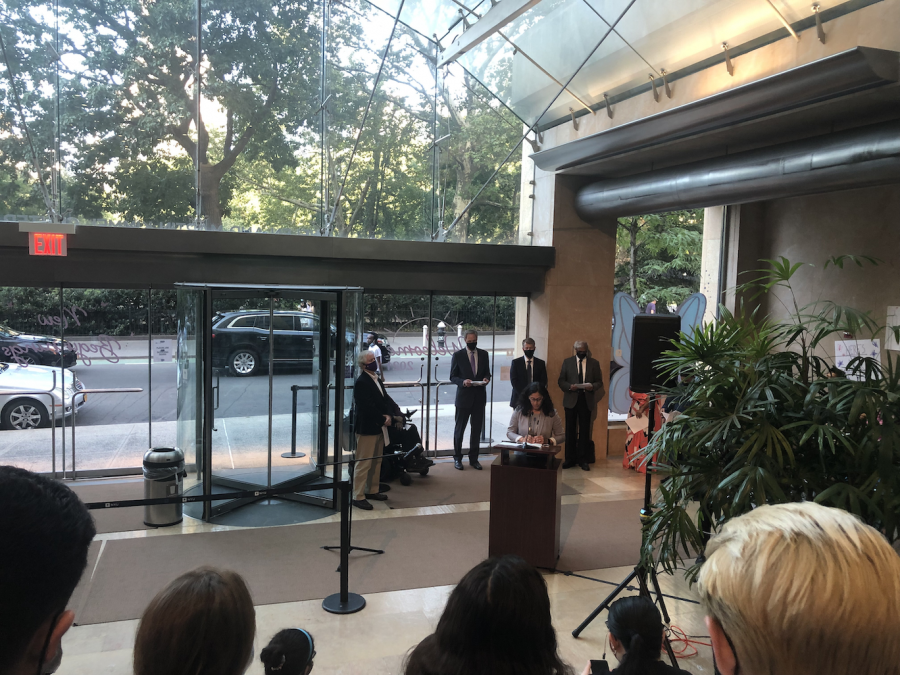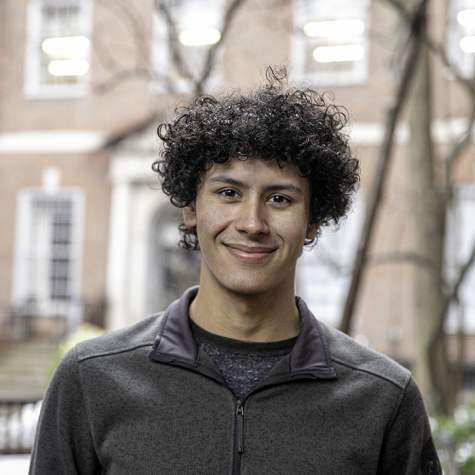Kimmel Center holds Sept. 11 remembrance event
Faculty and staff recalled their stories of the World Trade Center attacks and shared messages of solidarity.
On Friday, Sept. 10, almost 50 members of the NYU community gathered on the steps of Kimmel to reflect and share stories on the 9/11 attacks, 20 years later. The names of the 59 alumni who died on 9/11 were read out loud, followed by a 20-second moment of silence. (Photo by Gabriel Hawthorne)
September 13, 2021
Nearly 50 members of the NYU community — including alumni, students, employees and faculty — sat together in silence on the bottom steps of the Kimmel Center for University Life on Friday, Sept. 10 to reflect on how the NYU community responded to the tragedies of Sept. 11, 2001.
During the event, the in-person attendees and 100 community members who joined via Zoom listened to stories from four university staff members who witnessed the attacks. CAS associate dean William Long, Law dean Trevor Morrison, SPS dean Angie Kamath, Steinhardt dean Jack Knott and Stern dean Raghu Sundaram read the names of 59 alumni who died on Sept. 11 before the audience held a 20-second moment of silence.
“Our hope is to bring people together to hear stories, to offer respect, to hear history to what happened, and to also focus on coming together in times of tragedy and love,” Melissa Carter, the interim senior director for Global Spiritual Life, said during the event.
A planning committee, which organized the event in a week, was put together after some students asked for a memorial to be hosted by the university.
“For me, history is always in the present … we need to keep that memory alive,” Allen M. McFarlane, the assistant vice president for Outreach and Engagement and event organizer, said in regard to his vision for the event.
While faculty members witnessed the attacks firsthand — in person or on TV — the majority of current students were either not alive or too young to comprehend the attacks. LS first-year Fernando Prieto Lin decided to attend the event to pay his respects.
“I decided to go to the event yesterday in memorial of all the lives lost that day, including the 59 individuals from the NYU community,” Lin wrote to WSN.
Reji Mathew, an adjunct assistant professor at the Silver School of Social Work, said that today’s teenagers and young adults have grown up in a world significantly shaped by the attacks, but he has hope in their ability to overcome the challenges of the present.
“In the midst of a pandemic with the looming challenges of climate change, I see a new generation speaking up, painstakingly forging a language of inclusion, a language of equity and a language of safety,” Mathew said.
Imam Khalid Latif, an NYU alum and the executive director of the university’s Islamic Center, also spoke about the impact of the events of Sept. 11 on him and other Muslim students.
During his sophomore year, Latif was taking a class in the Silver building when a public safety officer told him to evacuate. When Latif returned to his residence hall, he was shocked at what he overheard from his floormates.
“We need to gather all the Muslims in this country and send them away so things like this don’t happen anymore,” Latif recalled one of his floormates saying.
In that moment, he knew that people would begin to target Muslim students based on the assumption that they were involved with the attacks. At the time of the attacks, NYU did not have many dedicated resources available to Muslim members of the community and Latif, along with other Muslim students, established a buddy system to ensure their safety.
“In the midst of that there were people who said, ‘We’re here if you need us,’” Latif said. “Our imperative, collectively, is to always choose unconditional love in the response of any tragedy no matter what, because it’s not real love if some of us have to now be marginalized in order for the rest to feel as if they have a space.”
A version of this story appeared in the Monday, Sept. 13, 2021, e-print issue. Contact Gabriel Hawthorne at [email protected].


























































































































































Allen McFarlane • Sep 13, 2021 at 9:27 am
Thank you for covering this event in the Washington Square News! I wanted to share that the many community members, units, committees have been discussing ways to commemorate this solemn event for the past year. Hearing from students was an inspiring act that added a lot of energy and commitment to the effort. In addition, this summer, NYU Public Affairs invited community members via an NYU 9/11 websites that captures even more stories. Here is the link: An opportunity to submit reflections (https://www.nyu.edu/about/news-publications/news/2021/august/9-11-memories-for-20th-anniversary.html).
Enjoy your day!